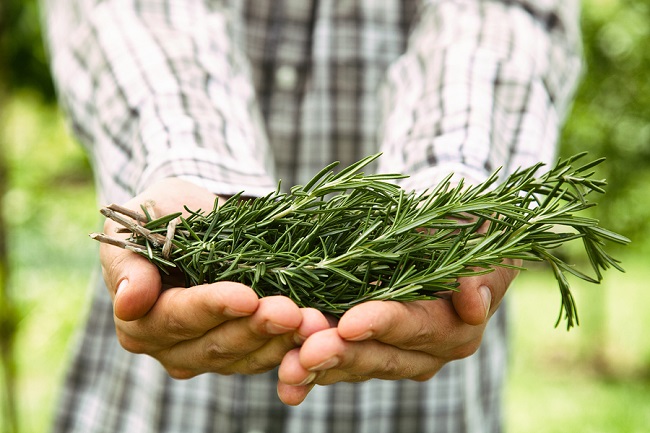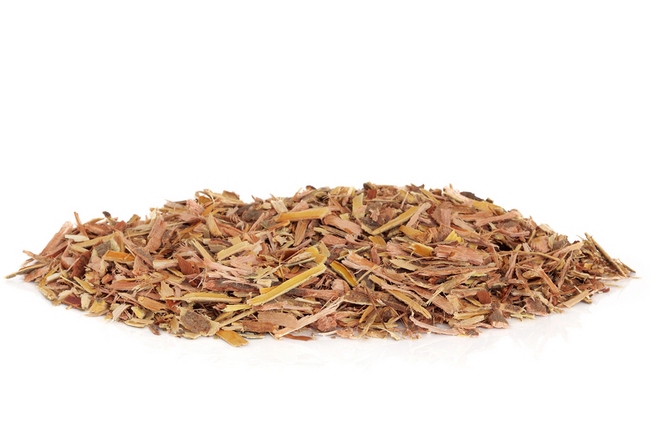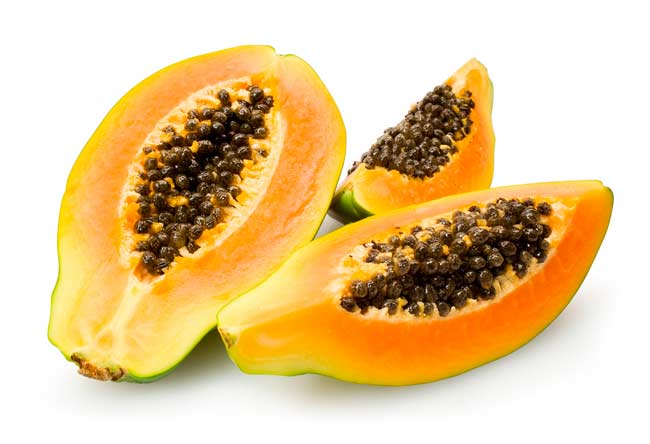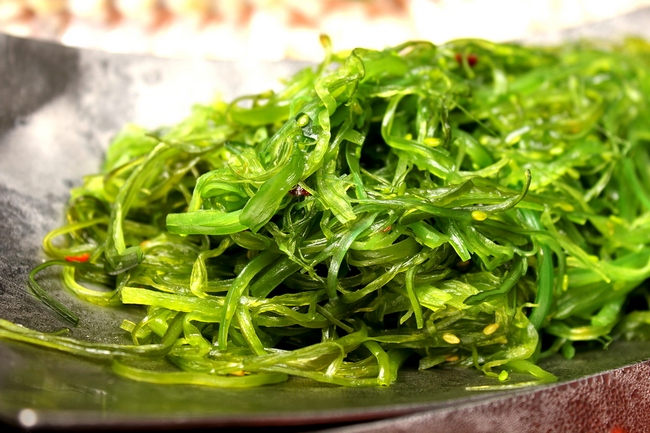- Make It Yourself Lavender Heart-Shaped Bath Bombs!
- 20 Things You Never Knew About “Down There”
- 12 Best Foods For Those Suffering From Arthritis Pain
- 12 Personal Hygiene Mistakes Almost Everyone Makes (Mom Never Told You About #4!)
- 15 Medicinal Plants And Herbs From The Cherokee People
- 12 Mind-Blowing Benefits Of Drinking Coconut Water During Pregnancy
- 12 Outstanding Winter Foods That Won’t Fatten You Up Like A Christmas Turkey
Top 20 Herbs and Foods to Beat Inflammation Once and for All!

Photo credit: bigstock.com
If you have been plagued with inflammation but don’t want to take any NSAIDs at the risk of all their side effects, you should be aware that there are plenty of other natural means to help rid the body of inflammation.
Many different things cause inflammation, since inflammation is a natural response to damage that has occurred to the body, or when a certain part of the body becomes irritated or overused, or when the immune system believes that the body has been invaded by some foreign substance.
In and of itself, inflammation is not a bad thing. It’s a necessary and protective response by your immune system to deal with short term damage. For example, if you sprain your ankle, this will cause acute inflammation, which will leave you with redness, swelling, pain, and immobility. Although this might be painful and annoying, it’s your body’s way of sending large amounts of new blood cells fluid, and other repair agents to the damaged area to remove damaged cells and tissue and build new ones.
When inflammation goes from acute to chronic, that is when the problem arises. Inflammation is supposed to be an initial response, and then it fades and lets other healing processes take over. When inflammation lasts longer than just a “first response” type of reaction, you begin to see other reactions in the body such as a lowered immune system response, degenerative diseases, and even deadly diseases such as cancer.
This is why you should never take inflammation lying down, so to speak. It can cause the body serious long term damage if left unattended. Chronic inflammation can be systemic or localized. System inflammation is seen in diseases such as heart disease, Crohn’s disease, and Celiac disease. Localized inflammation can be arthritis of the hands, for example, IBD, or cirrhosis of the liver.
There are plenty of natural ways you can help to reduce and even eliminate inflammation in the body. Keep reading and find out the top 10 herbs and best 10 foods you can consume to help reduce inflammation every single day.
Herbs
The number of herbs that will help reduce inflammation are almost too numerous to mention. We have made a list of the top 10 that do an outstanding job of fighting inflammation.
1. Licorice
Most people immediately think of candy when they think of licorice, but it can actually be added to many meat and vegetable dishes for a unique flavor combination. It also makes an excellent tea. Licorice is also a natural antidepressant that works wonders at fighting inflammation in the body since it is loaded with flavonoids. Licorice root can be used to treat liver problems, arthritis, dental issues, and viral infections.
2. Rosemary
Grown almost everywhere in the world, rosemary can be used in almost every food dish, and can also be made into a tasty tea. Rosemary has strong diaphoretic and tonic effects; this is another herb that is loaded with flavonoids, which makes it a very efficient anti-inflammatory. Be careful not to consume too much of this herb as it can block the absorption of iron, which won’t cause anemia in and of itself, but it can worsen preexisting conditions. If you are anemic or are pregnant, you should consult your doctor before using rosemary.
3. Cinnamon
Who doesn’t just adore the taste of cinnamon? The good news here is that cinnamon can work wonders for the body by reducing its inflammatory responses. Studies done on animals show that cinnamon can reduce inflammation and fight unwanted bacteria. If you are taking blood thinners or heart medication you should consult your doctor before consuming large amounts of cinnamon supplements. Adding some to your oatmeal or coffee shouldn’t be a problem, but if you are taking any prescription medications, it’s always best to check with your doctor first.
YOU MIGHT ALSO LIKE: 10 Things You Should Never Do If You Want to Beat Inflammation
4. Basil
This fragrant herb that most of us associate with Italian food or salads is a terrific anti-inflammatory. Basil inhibits the same enzyme that is blocked by over the counter NAIDS such as ibuprofen. The main ingredient in basil is called eugenol, which gives this herb its powerful anti-anti-inflammatory compounds. One study published in 2003 in the Journal of Microbiology Methods showed that basil can stop certain types of bacteria that tend to cause inflammation in the body.
5. Cayenne
Although you might think that this spice is the exact opposite of what you want, the heat that cayenne pepper produces actually reduces the heat of inflammation in the body when consumed. Cayenne, along with other types of hot peppers, contains capsaicin, which blocks the COX-2 enzyme that causes an inflammatory response in the body. COX-2 is most often associated with arthritis and other types of inflammatory diseases. Read more about cayenne benefits.
Continue to Page 2

Photo credit: bigstock.com
6. Garlic
There are several sulphur compounds in garlic which give it major fighting power against inflammation. These compounds have also been proven to fight off heart disease, reduce your risk of developing certain types of cancer, and have anti-microbial compounds as well.
7. White Willow Bark
The bark from white willow trees contains a substance called salicin, which is similar to acetylsalicylic acid- also known as plain old aspirin. However, the pain relief and anti-inflammatory effects of this bark last far longer than aspirin actually does. Note that white willow bark has the same blood thinning effects that aspirin does, so it will inhibit the pro-inflammatory pathways in the body, but it can interact with other prescription drugs. Always consult with your physician before consuming this herbal supplement to be sure it is the right one for you.
8. Oregano
With its powerful polyphenols and bioflavonoids, this spice can help to fight the production and free radicals which cause damage to the cells, which will produce an inflammatory response. The fewer free radicals you have damaging the cells in your body, the less overall inflammation you will have.
9. Ginger
Ginger has 4 powerful ingredients, which make it an excellent anti-inflammatory and analgesic. Zingerone, shagols, gingerols, and paradol all work in combination to fight the pain causing prostaglandins in your body, which will help reduce overall inflammation.
10. Turmeric
Perhaps the biggest anti-inflammatory of them all. The active ingredient in turmeric is called curcumin. Studies have shown that curcumin can protect the liver from cell damage by adding as an antioxidant, which helps to stop free radicals from causing damage at a cellular level. Turmeric can also protect the brain from inflammation, reducing your risk of Alzheimer’s, and it lowers histamine levels, which are also an important way to fight inflammation.
Continue to Page 2

Photo credit: bigstock.com
Foods
Mother Nature makes plenty of foods to help the body heal itself naturally. You can transform the chemistry of your body simply by eating certain foods. Check out the top 10 anti-inflammatory foods and add more of them to your diet.
1. Papaya
This tropical fruit is similar to pineapple in that it contains an enzyme called papain, which will help reduce inflammation in the body, especially throughout the digestive tract. If you want to improve digestion or if you have any type of digestive issue such as IBD or Crohn’s disease, then you should try to eat some papaya almost every day.
2. Omega-3 Fatty Acids
This is perhaps the easiest and best way to kick inflammation to the curb. Omega-3 rich foods will stop inflammation by blocking the prostaglandin pathways that cause inflammation, while at the same time supporting pathways that reduce inflammation. Omega-3 fatty acids can be a lifesaver when it comes to fighting inflammation, You can eat more hemp seeds, olives, walnuts, chia seeds, avocados, and fatty fish such as salmon, anchovies, and sardines, to increase your intake of omega-3, or you can take fish oil or krill oil supplements.
3. Apples
The skin of apples contains a substance called quercetin, which acts as a natural antihistamine in the body. Quercetin will work to fight off environmental allergies, and fight off the inflammation that can often occur as a result of these allergies.
4. Leafy Green Vegetables
Your momma was right about eating your greens! The chlorophyll in green veggies has an alkalizing effect on the body. When the body is on the alkaline side, it can dramatically reduce levels of inflammation. Some of the best leafy greens are kale, red leaf lettuce, bok choy, green leaf lettuce, romaine lettuce, spinach, and Swiss chard. Eat a wide variety of these greens every single day for best results.
5. Pineapple
Like papaya, pineapples contain a special enzyme called bromelain, which works to reduce inflammation in the body, especially within the digestive system.
Continue to Page 4

Photo credit: bigstock.com
6. Seaweed
You might make a face at the thought of this, but the truth is that seaweed is some of the most nutrient dense food anywhere on the planet. Seaweed is full of alkaline minerals which help to reduce inflammation by alkalizing the body. Seaweed is also a great way to balance hormones and is a powerful detoxing agent. If the thought of eating sea vegetables is too gross, take supplements.
7. Coconuts and/or Coconut Oil
Both fresh coconuts and coconut oil contain medium chain triglycerides, which is what gives these foods their super anti-inflammatory capabilities. The lauric acid and caprylic acid are anti-microbial as well, which will further reduce inflammation. Coconut oil can be used topically as well as be consumed to help reduce inflammation. Use it in your morning coffee and then spread some coconut oil on your face to help stop acne.
8. Dark Green Vegetables
We are back to green, friends! Vegetables that have dark green colors, such as broccoli, celery, zucchini, and cucumbers, all have powerful alkalizing effects on the body. If possible, eat these veggies as raw as possible to get all the inflammation fighting power that you can. Juice them, add them to green smoothies, or just lightly steam them to capitalize on their inflammation fighting power.
9. Berries
All berries, no matter which ones you prefer, are loaded with powerful antioxidants. You want as many antioxidants as you can get as these little powerhouses work overtime to protect you from those damaging free radicals. So eat plenty of whatever is in season: blueberries, strawberries, cranberries, blackberries, raspberries, or even cherries, to get your share of antioxidant goodness in every little bite.
SEE ALSO: 12 Super Foods that Combat Inflammation
10. Asian Mushrooms
Mushrooms from Asia including maitake, oyster, Cordyceps, Shiitake, lobster, reishi, and Portobello mushrooms are all immune system boosters that are unlike anything else on the planet. This will help to slow down cell damage and thereby reduce the inflammation response by your immune system. These mushrooms have so much more to offer us also including protection from many different types of chronic diseases, including cancer. You can’t go wrong by adding some of these types of mushrooms to your salad or eggs every single day.
Besides adding these foods to your diet, be sure to stay away from foods that increase inflammation including wheat, processed foods, junk foods, and sugar.
As always, if you are pregnant, nursing, or are trying to become pregnant, or if you are taking any type of prescription medication, always consult your doctor before beginning any herbal or supplement program. Although most herbs and foods are safe for most people, there can be serious drug interactions or other types of problems for some people. Please consult with your doctor and discuss all of your health options.
References:

































